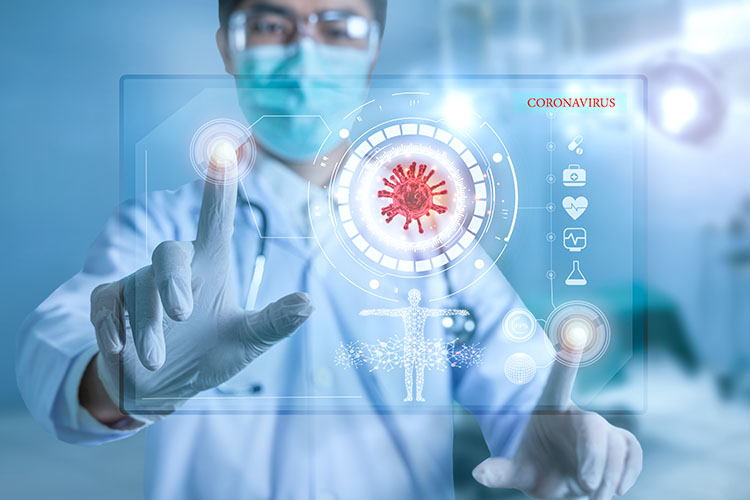The research-based industry response to COVID-19; collaboration and innovation
Posted: 26 August 2021 | Nathalie Moll (European Federation of Pharmaceutical Industries and Associations [EFPIA]) | No comments yet
Nathalie Moll, Director General of the European Federation of Pharmaceutical Industries and Associations (EFPIA) gives her take on the industry response to the pandemic; highlighting the benefits of focused effort and what can be achieved through unified collaboration.


SINCE A PNEUMONIA of unknown cause was detected in Wuhan, China and reported to the World Health Organization (WHO) Country Office in China on 31 December 2019, there has been in excess of 194 million confirmed cases and more than four million deaths from COVID-19.1 The outbreak was declared a Public Health Emergency of International Concern on 30 January 2020. On 11 February 2020, WHO announced the name for the novel coronavirus disease: COVID-19. In the absence of licensed therapies to treat patients, or vaccines to protect citizens, our only defence was to close our doors, cut ourselves off from colleagues, friends and families in persistent and enduring lockdowns.
Very quickly Europe was at the epicentre of the COVID-19 crisis; the European research-based pharmaceutical industry, together with colleagues from around the world, came together to commit resources, expertise and people to the fight against COVID-19. In practice, this meant donating money and in-kind support to health systems, governments and organisations on the ground. It meant pulling out every stop to ensure the safe supply of medicines to the patients that needed them and, perhaps most importantly, working around the clock to find new vaccines, diagnostics and treatments to fight the disease. These three priorities were enshrined in the EFPIA-Vaccines Europe commitments2 on COVID-19.
With the overnight loss of air-freight options, the onset of border restrictions, stockpiling and export restrictions, one of the most immediate challenges for the industry was to ensure that patients across Europe received the medicines they needed, when and where they needed them.
Pandemic pressures
COVID-19 put immense strain on Europe’s intensive care units, including the demand for medicines used in critical care. Through working closely with the European Commission (EC), Member States and other actors in the supply chain, the research-based industry was able to implement its pandemic preparedness plans, increase capacity – in some cases by 800 percent – and meet the needs of patients across Europe in the face of extremely difficult circumstances.
One very clear lesson from the pandemic is the vital role of medical innovation in addressing global health threats and existing health challenges”
Similarly, the pandemic impacted the many thousands of patients across the EU that take part in over 4,000 clinical trials for new medicines across many therapy areas. Working closely with the European Medicines Agency (EMA), companies and regulators found innovative ways to support the continuity of clinical trials, critical to trial participants and future advances in patient care.
As in many sectors, the pandemic gave rise to a range of challenges in keeping critical daily operations going. This required constant analysis of the situation with an intense focus on mitigating any potential impact on patients. However, perhaps the biggest challenge with the eyes of the world upon us, was to find diagnostics, treatments and vaccines to provide a route out from under the shadow of the coronavirus.
R&D unity
Our researchers and scientists have worked around the clock to accelerate the R&D of vaccines, diagnostics and therapeutics for use against COVID-19. Collaboration was a key feature of the industry response to the pandemic. Multiple research initiatives were established in record time, working with academic groups, start-ups and vaccine manufacturers to find and test preventative tools.
Even with this monumental, collaborative effort there is still significant inequity in the rates of vaccination around the world”
Vaccine development typically takes several years of R&D and clinical trials, but the sheer scale of this global pandemic called for more urgent solutions. Researchers across the world joined forces on an unprecedented scale to speed up the process, leveraging science and technology developed during other epidemics like Ebola and Zika, and conducting phases of development in parallel without ever compromising on safety.
By the end of 2020, we saw the first vaccine approved for use in Europe. To date, we have four vaccines approved for use in the EU, 103 candidates in clinical trials and 184 vaccines in pre-clinical development.3
Discovering and developing safe and effective vaccines against COVID-19 was just the first chapter in the recovery story. This global pandemic required and continues to require a global response. It has meant expanding existing manufacturing capacity and creating over 300 production and supply deals around the world to ensure we can manufacture the billions of doses required to protect people worldwide. To date, 4.21 billion4 people have received their first dose and the industry is on target to manufacture the 11 billion doses required to vaccinate at least 70 percent of the adult population of the globe by the end of 2021.
Even with this monumental, collaborative effort there is still significant inequity in the rates of vaccination around the world. Manufacturers, governments and non-governmental organisations must work together to take urgent steps to further address this inequity. In May 2021, EFPIA-Vaccines Europe, along with the International Federation of Pharmaceutical Manufacturers & Associations (IFPMA) and other leading pharmaceutical associations published a five-step action plan5 to address vaccine equity around the world. The steps were:
- to establish dose sharing across countries, particularly where countries have excess supply
- to continue to optimise production
- to eliminate trade barriers
- to support country readiness; and
- drive further innovation.
What have we learned through the human and economic devastation of the pandemic? What can we evolve, change or do differently?
Spotlight on innovation
One very clear lesson from the pandemic is the vital role of medical innovation in addressing global health threats and existing health challenges. As the EU evolves its pharmaceutical policy framework, it is an ideal opportunity to create an innovation ecosystem equipped to deliver the next generation of diagnostics, treatments and vaccines, and ensure Europe remains competitive with other regions of the world in the race to attract life science investments.
We learned that the supply chains for innovative medicines were resilient in the face of immense challenges and, learning from the pandemic experience, that regulatory harmonisation, flexible labelling requirements, transparency and co‑operation on demand data, and supporting global supply chains are recipes to help ensure that patients in Europe get the medicines they need.
We know that COVID-19 took the world by surprise and more can be done to ensure pandemic preparedness, including to ensure that we address the silent pandemic of antimicrobial resistance already impacting the world.
As the EU evolves its pharmaceutical policy framework, it is an ideal opportunity to create an innovation ecosystem equipped to deliver the next generation of diagnostics, treatments and vaccines”
Finally, we know that COVID-19 underlined the inextricable link between our health and the world’s economic wellbeing. We need to invest in patient‑centred, outcomes-focused healthcare systems and address societal challenges in partnership, including working with governments to reduce access delays and improve the availability of medicines for patients across Europe. Recent data from the EFPIA WAIT indicator report6 showed that across Europe, patients must wait between four months and 2.5 years to gain access to the same medicine.7 To deliver more equitable access to medicines across Europe requires a clear picture of the access-to-medicines landscape and an evidence-based, common understanding of the root causes of barriers and delays to access. Progress requires a broad involvement of stakeholders to create more equitable access to innovative medicines; there is no magic bullet.
The industry response to the pandemic has centred on innovation and collaboration: working together to find new treatments and vaccines, creating new partnerships to manufacture on an unprecedented scale and working with governments and the international organisations to find pragmatic solutions that put the needs of patients first throughout the pandemic. As we begin to see the impact of this response, our hope is that the lessons learned can be applied to the wider healthcare setting and together we can emerge from the crisis stronger than before.
About the European Federation of Pharmaceutical Industries and Associations (EFPIA)
EFPIA represents the pharmaceutical industry operating in Europe. Together with its direct membership of 40 leading pharmaceutical companies, 33 national associations representing over 1,900 companies and in collaboration with health and research players, EFPIA’s mission is to create an environment that enables its members to innovate, discover, develop and deliver new therapies and vaccines for people across Europe, as well as contribute to the European economy.
About the author
Nathalie Moll joined the European Federation of Pharmaceutical Industries and Associations (EFPIA) as Director General in April 2017. Prior to joining EFPIA, between 2010 and 2017, Nathalie was the Secretary General of EuropaBio, ranked as the most effective European trade association in Brussels in 2013. She has spent over 20 years working for the biotech industry at EU and national level in associations and corporate positions and held the position of Chair and Vice Chair of the International Council of Biotech Associations (ICBA). In 2013, Nathalie won the Technovisionaries Women Innovation Award organised by Women & Technologies® while in 2009, Nathalie and the Green Biotech Team of EuropaBio were presented with the Leadership and Excellence in Advancing Ag-Biotech and Food Issues Award. Nathalie was also named one of the 15 leading women in biotech in Europe in 2017 and recognised as one of the ‘20 Women Who Shape Brussels’ by POLITICO Europe in 2020. Nathalie holds an Honours Degree in Biochemistry and Biotechnology from St Andrews University, Scotland.
References
- COVID-19 situation update worldwide, as of week 30, updated 5 August 2021 [Internet]. European Centre for Disease Prevention and Control. 2021 [cited July 2021]. Available from: https://www.ecdc.europa.eu/en/geographical-distribution-2019-ncov-cases
- The European research-based pharmaceutical industry’s commitment to tackling the coronavirus pandemic [Internet]. European Federation of Pharmaceutical Industries and Associations (EFPIA); 2021 [cited July 2021]. Available from: https://www.efpia.eu/media/413714/the…
- Vaccine industry response to COVID-19 – Vaccines Europe [Internet]. Vaccines Europe. 2021 [cited July 2021]. Available from: https://www.vaccineseurope.eu/vaccine-industry-response-to-covid-19
- Ritchie H, Ortiz-Ospina E, Beltekian D, Mathieu E, Hasell J, Macdonald B et al. Coronavirus Pandemic (COVID-19) [Internet]. Our World in Data. 2021 [cited July 2021]. Available from: https://ourworldindata.org/covid-vaccinations
- Five steps to urgently advance COVID-19 vaccine equity [Internet]. Efpia.eu. 2021 [cited July 2021]. Available from: https://www.efpia.eu/news-events/the-efpia-view/…
- Newton M, Scott K, Troein P. EFPIA Patients W.A.I.T. Indicator 2020 Survey [Internet]. IQVIA; 2021 [cited July 2021]. Available from: https://www.efpia.eu/media/602652/efpia…
- Newton M, Scott K, Troein P. EFPIA Patients W.A.I.T. Indicator 2020 Survey: Slide 9 [Internet]. IQVIA; 2021 [cited July 2021]. Available from: https://efpia.eu/media/602652/efpia…
Issue
Related topics
Biologics, Drug Development, Drug Discovery, Drug Manufacturing, Industry Insight, Research & Development (R&D), Supply Chain, Technology, Therapeutics, Vaccines, Viruses
Related organisations
European Union (EU), International Federation of Pharmaceutical Manufacturers & Associations (IFPMA), The European Commission (EC), The European Medicines Agency (EMA), The World Health Organization (WHO), Vaccines Europe









